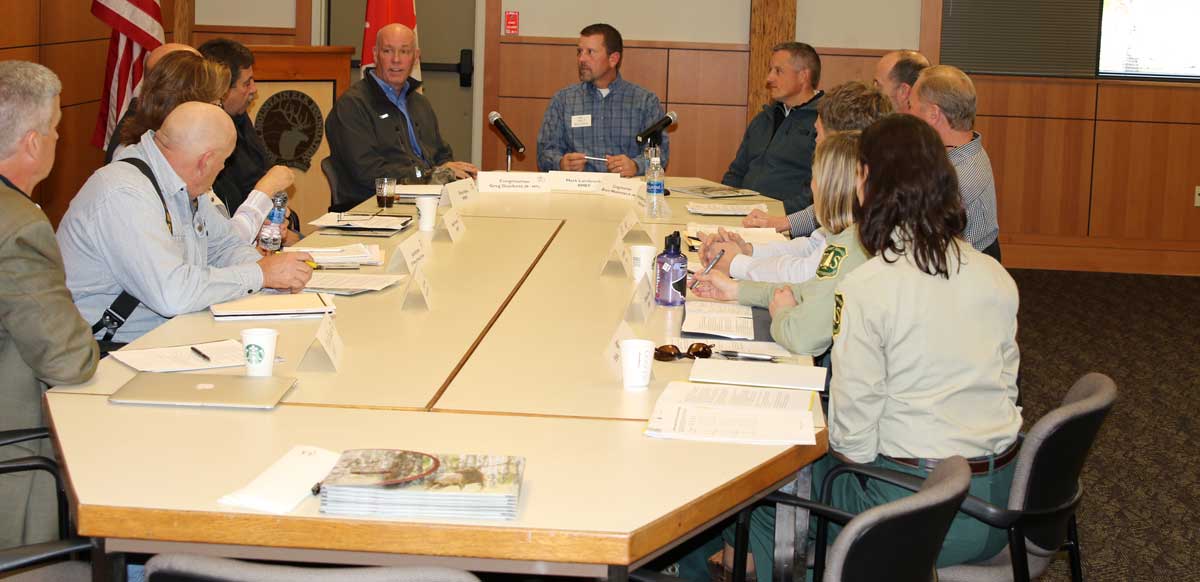Editor note: The U.S. House passed the Resilient Federal Forests Act on Nov. 1 by a vote of 232-188.The Rocky Mountain Elk Foundation hosted Congressman Bruce Westerman (R-Arkansas), Greg Gianforte (R-Montana) and representatives of the U.S. Forest Service, timber industry, conservation groups and media members for a roundtable discussion about the need for active forest management.
Specifically, Rep. Westerman introduced the Resilient Federal Forests Act of 2017. It is designed to increase proactive forest management to promote healthy forests and enhance wildlife habitat, provide disaster funding for fighting wildfires, reform the process to promote collaboration and decrease frivolous environmental lawsuits, and pave the way for enhanced restoration after wildfires.
Prior to the roundtable, the group toured a lumber operation and visited a landscape restoration project in western Montana.
Below are some of the comments made at the roundtable discussion:
 Rep. Bruce Westerman (R-Arkansas):
Rep. Bruce Westerman (R-Arkansas):
There is no downside to a healthy forest. I feel like a clanging cymbal because I say it so many times. We’ve got to the point in our country where we’re literally loving our trees to death. People have a natural affection for forests and trees and we need to get the right information out about how to keep those trees and forests healthy. The general public just thinks leave them alone and they’ll be okay but we know trees are living. Forests are dynamic. They change every day. We’re mismanaging our forests. A no action decision is a management decision.
I think Teddy Roosevelt used the term that “If we behave as we should, we would leave the land in a situation better than we found it for future generations.” Right now we can’t say that. We’re not leaving our forests better for future generations. The science is behind what we’re talking about.
It’s easy to observe to know a healthy forest service means you get clean air and clean water. You get better wildlife habitat for species like elk but for a whole gambit of other species that love healthy forests.
Most of the drinking water in our country comes from forests. It’s been purified by our national forests. As many issues as there are in the West, you’d think there’s be a lot more emphasis on forests and forest management just from the water conservation standpoint. We know that a healthy forest gives us better recreational opportunities and provides beautiful vistas.
$1.2 million has been paid to groups for attorney fees since January 2016 that filed lawsuits specifically against forest plans. We need to address the root of the cause—not the symptom of the cause.
 Rep. Greg Gianforte (R-Montana):
Rep. Greg Gianforte (R-Montana):
Fuel comes out of the forest only one of two ways. We either burn it or we remove it and we’ve stopped removing fuel from our forests. Every year we set a new record for fires. I did co-sponsor the bill with Congressman Westerman because we need reform and bring some common sense ability to get forest management projects approved. We’ve got to fix this problem. We can’t keep doing the same things and expect a different result.
These frivolous lawsuits have become a business model. We need to preserve people’s rights to have their voice heard but we’ve got to slow down these frivolous lawsuits that prevent us from getting in the forest and managing our forests.
 David Allen – RMEF President/CEO:
David Allen – RMEF President/CEO:
Managed forests are common sense. It means there has to be responsible action. It is proven science that it is better for wildlife. Obviously we believe in managing the forest not only for our citizens and our populations but we’re focused on wildlife management. There’s no question that habitat management is key to elk and everything else that lives in that ecosystem. We want to see some long-term management goals and strategies. We can’t keep starting and stopping and starting and stopping.
If you look at elk populations, in this state or any other state, where do elk populate? We have science that shows it’s mostly on private land. There are a couple of good reasons for that. One is safety. In the winter after hunting season, the primary reason they’re congregating on private land is because private land is managed. It’s where the groceries are. That’s what we’re missing on our public lands more and more across the country is better winter habitat.”
The Rocky Mountain Elk Foundation stands in support of the Resilient Federal Forests Act of 2017. This comprehensive legislation would expedite forest management activities on public lands, discourage litigation that has needlessly stopped necessary forest management projects and put an end to the practice of borrowing from agency budgets to pay for wildfire suppression. We recognize Congressman Westerman for taking the lead on this important issue and Congressman Gianforte for signing on as a cosponsor and for bringing sportsmen and industry folks together to talk about the bill. Active forest management, including well-planned logging, prescribed burning, weed treatments and grazing improves forest health, creates landscape diversity, and improves forage for elk and other wildlife said.
